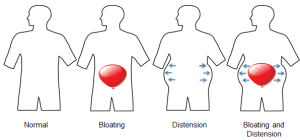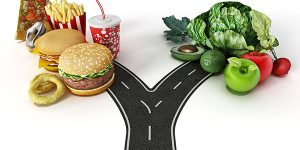
Understanding Bloating
Bloating is a common digestive discomfort characterized by a sensation of fullness, tightness, or swelling in the abdomen. It often occurs when the gastrointestinal tract becomes filled with gas, leading to a visibly distended or swollen abdomen. Bloating can result from various factors, including overeating, gas production during digestion, slow digestion, and certain dietary choices. While it is usually not a serious medical condition, persistent or severe bloating may be indicative of underlying digestive issues that require attention and evaluation. Symptoms may include abdominal pain, discomfort, and changes in bowel habits.

Causes of Bloating
Overeating:
Consuming large quantities of food can overwhelm the digestive system, leading to an accumulation of gas and causing bloating.
Gas Production:
Certain foods, especially those high in fiber, can undergo fermentation in the colon, producing gas as a byproduct. This gas accumulation contributes to bloating.
Swallowing Air:
Habits like eating too quickly, drinking through straws, or talking while eating can lead to the unintentional swallowing of air, causing the stomach to become distended.
Digestive Disorders:
Conditions such as irritable bowel syndrome (IBS), inflammatory bowel disease (IBD), or celiac disease can disrupt normal digestive processes, resulting in chronic bloating.

Lactose Intolerance:
Individuals with lactose intolerance lack the enzyme needed to properly digest lactose, a sugar found in dairy products. The undigested lactose can lead to gas production and bloating.
Constipation:
Slow or infrequent bowel movements can cause a buildup of gas and stool in the intestines, contributing to abdominal bloating.
Artificial Sweeteners:
Some sugar substitutes, such as sorbitol and mannitol, are known to be poorly absorbed in the digestive tract. Consumption of products containing these sweeteners can lead to increased gas production and bloating.

Preventions from Bloating
Here’s 18 Ways to Reduce Bloating:
Hydrate Adequately
Drink plenty of water to prevent dehydration and promote regular bowel movements, reducing the likelihood of bloating.
Chew Mindfully
Slow down while eating, chew your food thoroughly, and avoid talking with your mouth full to minimize air intake and prevent bloating.
Gradual Fiber Intake
Increase fiber intake gradually to allow your digestive system to adapt, promoting regular bowel movements and reducing bloating.
Limit Gas-Producing Foods
Cut back on gas-producing foods like beans, cabbage, and carbonated drinks to minimize excess gas and alleviate bloating.

Embrace Probiotics
Incorporate probiotic-rich foods or supplements to balance gut bacteria, aiding digestion and reducing the potential for bloating.
Explore Low-FODMAP Diet
Consider a low-FODMAP diet to identify and avoid fermentable carbs that may contribute to bloating in sensitive individuals.
Peppermint Oil Capsules
Utilize peppermint oil capsules, known for their anti-spasmodic properties, to relax digestive muscles and ease bloating discomfort.
Prioritize Regular Exercise
Engage in regular physical activity to stimulate bowel movements, promote overall digestive health, and reduce bloating.
Stress Management Techniques
Practice stress-reducing activities such as meditation or yoga to minimize stress-induced bloating.
Limit Artificial Sweeteners
Minimize intake of artificial sweeteners, which can disrupt gut bacteria and contribute to bloating.
Monitor Sodium Intake
Reduce sodium consumption to prevent water retention, a common cause of bloating.
Strategic Meal Timing
Space out meals throughout the day, avoiding large, heavy meals late at night to prevent bloating discomfort.
Ginger Tea After Meals
Enjoy ginger tea after meals to capitalize on its anti-inflammatory properties and soothe the digestive system.

Dandelion Tea as a Diuretic
Try dandelion tea as a natural diuretic to reduce water retention and alleviate bloating.
Start Your Day with Warm Lemon Water
Kickstart your digestion each morning with warm lemon water to promote a healthy balance in the digestive tract.
Assess Dairy Tolerance
Monitor your tolerance to dairy and consider lactose-free alternatives if dairy triggers bloating.
Gentle Abdominal Massages
Incorporate gentle abdominal massages to stimulate digestion and provide relief from bloating discomfort.

Seek Professional Guidance
Consult with a healthcare professional if bloating persists, as it could be a sign of underlying digestive issues that require specific attention.
| Strategy | Description |
|---|---|
| Hydration | Adequate water intake promotes regular bowel movements, preventing dehydration-related bloating. |
| Fiber Management | Gradual increase in fiber aids digestion, reduces constipation, and minimizes potential for bloating. |
| Probiotics vs. Low-FODMAP Diet | Probiotics balance gut bacteria, while a Low-FODMAP diet identifies and avoids fermentable carbs causing bloating. |
| Physical Activity | Regular exercise stimulates bowel movements, enhancing overall digestive health and reducing bloating. |
| Stress Management | Stress-reducing techniques like meditation prevent stress-induced bloating and promote digestive ease. |
Conclusion
In conclusion, overcoming the discomfort of bloating involves adopting a multifaceted approach that addresses various aspects of diet, lifestyle, and overall well-being. By incorporating strategies such as mindful eating, gradual fiber intake, and hydration, individuals can proactively manage and reduce bloating. Experimenting with probiotics or exploring a Low-FODMAP diet offers tailored solutions for those with specific digestive sensitivities. Additionally, staying physically active, managing stress, and seeking professional guidance when needed contribute to a holistic approach for long-term bloating relief. Embracing these strategies empowers individuals to reclaim control over their digestive health and foster a more comfortable and bloat-free lifestyle.









